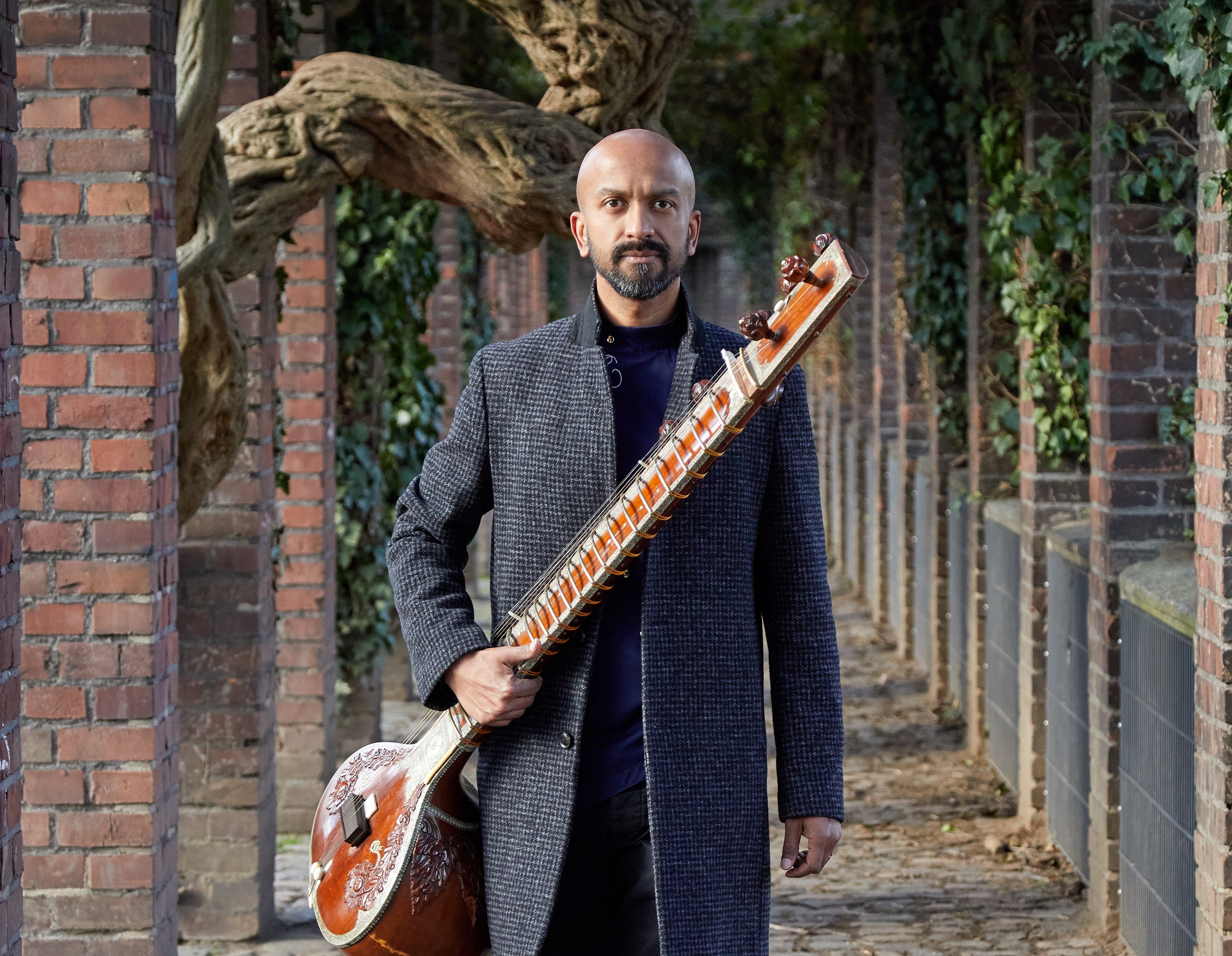
10 Feb In Conversation with: Hindol Deb
The ‘In Conversation with’ series brings to you the stories of musicians and their journeys. Music is an equaliser, and has the unique ability to traverse cultural, and linguistic boundaries to connect us through harmonies, rhythms, and melodies. Today’s conversation features the story of sitarist, composer, and educator, Hindol Deb– an artist who encapsulates the essence of a global musician, and exemplifies the symbiosis of modern and traditional, classical and contemporary, local and global.
Studying Hindustani Classical music under the tutelage of his father Sri Panchanan Sardar, Hindol Deb’s first steps into the world of music were steeped in discipline, dedication, and devotion. Waking up as early as 5am for rigorous practice sessions in his youth, he was surrounded by records of the stalwarts of Hindustani Classical music from Pandit Bhimsen Joshi, to Vidhushi Kishori Amonkar, and sitar virtuoso Pandit Nikhil Banerjee. Deb’s learning regime under his father’s guidance was strict, and he was strongly encouraged to remain within the world of Hindustani Classical music in his listening, practicing, and playing. However, from an early age he had an innate curiosity to explore different musical worlds, with a strong desire to bring them together– a curiosity he realised when he found himself secretly listening to a Jazz radio show with his sister in his father’s absence, and said to her, “I will bring these worlds together.” The seemingly innocent words of a young teenage boy said in passing were hinting at a prophecy now fulfilled.
India to Germany
Speaking to us from Germany, Hindol deb is now an acclaimed composer, educator, and performer who has mastered the art of merging different worlds of music to create eclectic, and layered musical compositions. He moved to Germany in 2015, to complete his Masters in Jazz Composition at Hochschule für Musik, Köln (Cologne University of Music, Cologne). Reflecting on his decision to study Jazz composition and move to Germany, Deb said, “I had been working with musicians outside India- jazz musicians, Scandinavian musicians playing Nordic music, Flamenco… The only thing that I was not satisfied with for myself is that I had to depend on the other person because I couldn’t compose myself. That is something that kept growing in me and eventually I thought that I have to have more knowledge on what I am doing. That’s when I started searching for universities outside India where I could learn more.” His hunger for knowledge, and urge to expand his horizons led to him travelling to Germany to study at Hochschule für Musik, Köln, where hon the basis of merit.
Delving into the world of Jazz composition with little prior understanding of Western music theory and communication proved to be an immensely challenging task. Reminiscing on his first interview at the University, Hindol recalls, “for the selection exam, I had to write an arrangement for the clarinet. During my selection interview, one of the professors took the paper and said to me, ‘I don’t know what to do with this paper and what you have written.’ From that, the entire experience of finishing my masters- it was quite a journey!” Birthing creations in a musical language different to the one Hindol had spent a lifetime imbibing tested him every step of the way. “Each time I would sit down, whatever would come out of me was Indian classical so it was really frustrating. I realised that was because I was not really opening myself up culturally to this society, and that was the point when I realised where the problem was. Then I started going to listen to more jazz concerts, research about the lifestyle and society I was in, and research different kinds of compositions.”
Through the research process, he found an unlikely ally in the music and sounds of the Middle East. “In Middle Eastern music- Turkish, Arabic or even Iranian music, the modal aspect is common with Indian music. But they have these changes in the tonal center which is a simpler form of what Jazz is. That was a connecting point for me. From there, I started slowly experimenting with what I was learning and learned how to think in a linear manner- not just cyclic, because here music is much more linear. Even if you come back to the one, it comes back much later in a very different way.”
Essence of Duality
The persistent efforts to go beyond borders, and build bridges through sonic explorations and experimentation grew into Hindol’s first full-length album ‘Essence of Duality’. “Essence of Duality combines the two worlds- my world and the ideas I had before in India, and the world I got into after coming to Germany. It is an outcome of what I studied. When I entered university over here, I used to experiment with different kinds of music- atonal music, serial music, mediaeval European music… The more I was learning about these styles of music and jazz harmonies, I kept asking myself, ‘what should I do with this knowledge and how can I use it?’ I started making rough compositions and taking it to my pianist Clemens Orth, who actually helped me a lot with this album. I got direct feedback from him while playing together and this way, I understood how it should sound and how it should not sound. I continued this process for a long time and ended up composing the entire album.”
Contemporary Perspective in Classical Traditions
Alongside his compositional work, Hindol Deb is also an accomplished music educator currently teaching workshops at several music schools, universities, and teaching Indian music in Popakademie Mannheim. In discussing the need for a shift in teaching methodologies and approaches in the Guru-Shishya parampara– a defining feature of Hindustani Classical music pedagogy, he says, “we are definitely in a different era where the system is in a little bit of danger. Not because the students are not willing to learn, not because the teachers are not willing to teach, but because we are living in an era with lots of things happening at the same time which takes us away from the level of concentration and peace one requires within oneself to learn, remember, and process information. With Indian Classical music, the teachers are expecting students to give a lot of time to them and the students don’t have that anymore. Even the teachers don’t have that anymore. The teachers want to perform, and the students want to become performers very quickly because they have the pressure. As a result of this, the teaching methodology has to change.”
“The teachers might have to look at it much more objectively than how they had been taught. Indian classical music training has to be much more structured, and I foresee a lot of young musicians wanting to experiment much more with western forms of music. For that, they would need to learn both perspectives.” Suggesting that Western music theory be included in the teaching and study of Indian Classical music, Hindol adds, “there is a lot of potential lying over there. One can see lots of western musicians learning Indian classical but there are hardly any Indian classical musicians who have crossed that boundary to learn the other perspective. As different cultures, we are merging together right now. The next era will see cultures merging. If one learns Western classical music at an early age, it remains.”
Crafting a Creative Practice
Emphasising the need for crafting a deep, meaningful practice regime, he says, “the environment and surrounding is of prime importance, as well as the motivation one would get from mixing with other fellow musicians. These aspects are important before one gets into his own practice regime. Once Pandit Suresh Talwalkar spoke about the different levels of practice, and he was making a distinction between practice and meditation. Practice is what you do regularly to get better on your instrument, whereas if you don’t feel good skipping even one day and your mind always wants to bring you to that, then you get into meditation. To do that, it’s very important to create one’s own timetable which is best if one can do that at a much earlier stage because the older you get, the busier you get.”
“It is not so important to practice many hours, because the intensity of the practice is what matters.” To young, aspiring musicians, he advices, “keep the mind open, but at the same time, don’t lose yourself in many different forms of music. Keep the ‘what’ and the ‘why’ very consciously in mind. What is the aim you have? There are so many things one can do, so to get out of that you need to continuously have a focus not dilute it with lots of other kinds of music. If you want to get into other forms, I’d say get deeper into the form- get into the depths of it and practice it at that level. That’s very important.”
Path Forward
Integrating his personal learnings from his learning journey into a structured method of teaching, Hindol would like to formulate and supervise a study program for young students of Indian Classical music. Alongside his educational aspirations, he hopes to arrange ‘Essence of Duality’ for a chamber orchestra, and compose a sitar concerto. “I have started working on it but it’s not something I can do alone so I am working together with some other musicians. Another album of mine, together with Swedish musicians- it’s a crossover of Nordic and Indian music, will be released in March. We did a concert tour with this music in 2010 and 2011 but we didn’t release it, so I am really looking forward to that.”
In addition to composing, performing, and educating, Hindol hopes to cultivate a larger listenership for Indian classical music in Germany. “I want to organise Indian classical music concerts over here but it is very difficult. Indian classical music was very popular in the 1980s- Indian classical music, philosophy, yoga- they all come in a wave and they come together. There is a crest and there is a trough- right now the interest here is not at the peak. To create that interest and motivate people to get into this kind of music will take time but I know that this music has something to offer that people can greatly benefit from.”
To remain updated on Hindol’s journey, you can follow him on Instagram and Spotify!
Written by Senjuti Maitra




No Comments